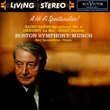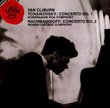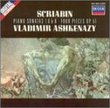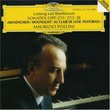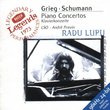| All Artists: Sir Arnold Bax, David Lloyd-Jones, Royal Scottish National Orchestra Title: Bax: Symphony No. 6; Into the Twilight; Summer Music Members Wishing: 0 Total Copies: 0 Label: Naxos Release Date: 4/15/2003 Genre: Classical Styles: Forms & Genres, Theatrical, Incidental & Program Music, Historical Periods, Modern, 20th, & 21st Century, Symphonies Number of Discs: 1 SwapaCD Credits: 1 UPC: 747313214426 |
Search - Sir Arnold Bax, David Lloyd-Jones, Royal Scottish National Orchestra :: Bax: Symphony No. 6; Into the Twilight; Summer Music
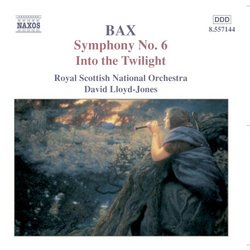 | Sir Arnold Bax, David Lloyd-Jones, Royal Scottish National Orchestra Bax: Symphony No. 6; Into the Twilight; Summer Music Genre: Classical
|
Larger Image |
CD DetailsSimilarly Requested CDs
|
CD Reviews"A World of Peace and Beauty" Thomas F. Bertonneau | Oswego, NY United States | 05/01/2003 (5 out of 5 stars) "May I begin with a confession? I have been a "Baxophile" since my late teens, when I first heard the composer's magnificent tone poem "Tintagel" (1917) on an Angel LP featuring Sir John Barbirolli and the Hallé Orchestra in a program mainly of Delius but with one item each by John Ireland and Sir Arnold Bax (1883 - 1953). This would have been around 1972. The evocation of seashore and sky, the magical atmosphere of the Cornish sagas, the big tune - all of this enthralled me immediately and I began swiftly to seek out other music by this then under-represented figure. It so happened that in those days the redoubtable Lyrita label, dedicated to British music, had inaugurated serial release of LPs of the Bax symphonies (seven in all), and an early item in their (ultimately incomplete) cycle was the Sixth Symphony (1934), performed by the London Symphony Orchestra led by Norman del Mar. The availability of the Sixth was fortuitous, for this score is definitely the pinnacle of Bax's symphonic sequence, each number of which amounts to a formidable achievement. Indeed, more than one Bax scholar agrees that the Sixth is a gem among gems, the score where Bax most perfectly matches his emotional intensity, thematic profusion, and sense of form. Like "Tintagel" and so much of his work, the Sixth Symphony reflects Bax's relation to remote and primitive parts of the British Isles, especially to the West Coast of Scotland where, at Morar, most of the symphony was written. Bax's Sixth appeared on the scene with two other important British symphonies: Ralph Vaughan Williams' Fourth and William Walton's First; Bax's Sixth shares with these two a mood of anger and apprehension, but of the three it is arguably the starkest and most pessimistic in its rugged beauty. In his lifetime, Bax heard the Sixth fewer times than he heard any of his other symphonies and regretted the paucity of performances. To appear on a commercial recording (that old Lyrita LP), the Sixth waited until thirty-five years after its premiere. Again in the early 1980s Bryden Thomson recorded it as part of his Bax survey for Chandos, and more recently Douglas Bostock released a traversal on Classico. Thomson and Bostock give good performances although in comparing them in memory with del Mar, it is del Mar who strikes me as having grasped the symphony best. The new recording by David Lloyd-Jones and the Royal Scottish National Orchestra on Naxos, on the other hand, finally offers real competition to the long unavailable del Mar. The First Movement (Moderato - Allegro Con Fuoco) of Bax's Sixth opens over throbbing triplets - an ostinato - in the bass; two groups of anguished themes unfold over this pattern. Halfway through the movement, Bax diminishes the note-values of the ostinato, giving the impression that the music has speeded up. The final bar of the First Movement needs to sound like a catastrophe. Annotator Graham Parlett (a redoubtable Bax-scholar who has orchestrated some of Bax's abandoned sketches) speaks metaphorically of the slamming of a door. Del Mar succeeded in conveying the cataclysm; so does Lloyd-Jones. The Middle Movement (Lento Molto Espressivo) is another of Bax's orchestral nocturnes, reminiscent of, although not so relaxed as, the central panel of the Third Symphony. The woodwind solos are especially ravishing. The Naxos engineers bring out an exceptional wealth of instrumental detail. The Third Movement (Lento - Allegro Vivace - Andante Semplice - Lento) incorporates a Scherzo and Trio and concludes in a patented Baxian Epilogue. There is a "Liturgical Theme," first given out quietly by the solo clarinet, which dominates the sequence thematically. The articulations are complicated, with many changes of tempo, but Lloyd-Jones manages them seamlessly. Once again, the Naxos engineers find an extraordinary wealth of colorful detail. Peter Pirie once wrote of this work that, in it, "the great conflict that had raged in Bax's symphonies from the first was finally resolved." Pirie described the Epilogue in particular as "a world of peace and beauty, but hardly this world." The program includes an early tone poem, "Into the Twilight" (1909), and a mid-career orchestral idyll, "Summer Music" (1921/32), the latter a kind of Baxian homage to Frederick Delius. The Lloyd-Jones cycle of Bax symphonies has leaped from strength to strength. Only the Seventh remains to be released. (It has already been recorded.) I strongly recommend this disc to Baxians and to those not familiar with the composer but made curious by the revival of his reputation." Superb on all counts David A. Kemp | Plano, TX USA | 05/26/2003 (5 out of 5 stars) "This is an absolutely magnificent CD. It earns highest marks in all areas: music, performance, sound, and value. What more could you ask?Music: Many good judges consider this the best of Bax's seven symphonies. It's not hard to see why. The music is immediately attractive and accessible, colorful and atmospheric, richly and imaginatively orchestrated, full of interest. The two tone poems, while perhaps not on the same level of inspiration as the symphony, are similarly atmospheric, attractive, and accessible.Performance: This is the sixth and next-to-last release in the Naxos cycle of Bax symphonies and tone poems: only No. 7 and "Tintagel" await release. It is a most distinguished series, throughout which the Royal Scottish National Orchestra and David Lloyd-Jones have provided sensitive, idiomatic, beautifully played, altogether persuasive performances that have made many converts to Bax. It is apparent that each recording has been painstakingly, lovingly prepared by an ardent and expert Baxian. The series has received much critical acclaim, and the acclaim has been fully deserved. Sound: The entire series has featured excellent sound, but this latest release (recorded in Glasgow Royal Concert Hall in August 2002) is to my ears the best-sounding one yet--so good, in fact, that the sound is in the top demonstration class, leaving nothing to be desired. It has marvelous transparency and openness, full frequency range (deep bass) and wide dynamic range, and every detail of the colorful orchestration is clearly heard, with never a hint of hardness, harshness, or congestion. Truly an audiophile's delight. Producer and engineer Tim Handley can be proud of his achievement here: this is modern digital orchestral recording at its finest. Value: This would be a splendid CD at full price. At the Naxos budget price, it's a steal. If you're interested in sampling the Naxos Bax cycle, or simply in trying one of the best recent Naxos releases, this is the perfect place to begin. I urge you not to miss this one." Superb Lance B. Sjogren | San Pedro, Ca United States | 03/13/2004 (5 out of 5 stars) "After not having listened to classical music for a couple of decades, I rekindled an interest when I began listening to our local classical FM stations while working out at the gym.One station played a piece a couple of months ago from Handley's Bax symphony cycle, and I thought "this sounds like a nice piece of modern-era classical music" and I bit the bullet and bought the whole Handley set, and was immensely pleased with all of Bax's symphonies. Since then I heard on the radio Bax's "Winter Legends", and thought "this sure sounds like Bax". I figured this was like my obsessive binge of listening to Mahler, in which every romantic-era piece I heard on the radio I figured was Mahler. But, the "Winter Tales" turned out indeed to be Bax. So, one can say, he certainly has a distinctive and identifiable style.I also obtained the Lloyd Jones renditions of Bax's symphonies. Upon listening to his rendition of the 6th, my feeling is, this is one of the best classical recordings I have ever heard. It is hard to compare versions of a piece of music objectively; differences in one's own mood for example may skew one's perceptions. But what I do feel I can say with confidence is that this is at least equal to if not superior to every other recorded work of a Bax composition I have heard.Regarding Bax per se. What intrigues me particularly about his music is that it seems to me he manages to deeply integrate modern tonal concepts into his music, while simultaneously maintaining a strong bond with classical music as it had evolved up to his day. When you combine that with the fact that he wrote a large body of symphonic work, I would be tempted to audaciously propose that he seems to me to be the composer most at the center of extending the classical line of orchestral music through the decades during which he composed. My exposure to classical music is admittedly limited, but at this point I would have to say that I consider Bax to be the preeminent composer of the modern era.This review may be a bit premature since I haven't heard the other 5 Lloyd Jones recordings yet. I particularly look forward to the 7th. In my view the "theme and variations" movement of Bax's 7th is one of the most beautiful pieces of music I have ever heard."
|

 Track Listings (5) - Disc #1
Track Listings (5) - Disc #1

